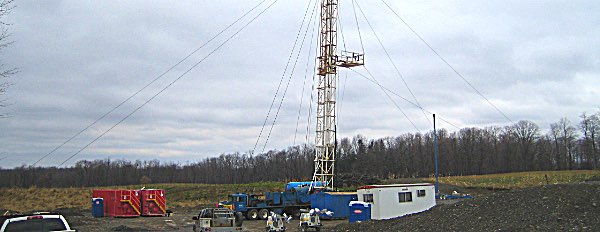- By New York State Governor's Office
- News
 Print
Print 
Governor Andrew M. Cuomo announced Wednesday legislation in the FY 2021 Executive Budget to make New York's fracking ban permanent. The measure would restrict the Department of Environmental Conservation from approving permits that would authorize an applicant to drill, deepen, plug back or convert wells that use high-volume hydraulic fracturing as a means to complete or recomplete a well, protecting the health of New Yorkers and ensuring permanently that our environment is not harmed by this practice. This bill reflects an important step forward toward achieving New York's clean energy economy goals.
"New York's leadership on hydraulic fracturing continues to protect the environment and public health, including the drinking water of millions of people, and we must make it permanent once and for all," Cuomo said. "In the five years since fracking was banned, we have proven that it was in fact, not the only economic option for the Southern Tier. The region has since become a hotbed for clean energy and economic development investment through programs like 76West and Southern Tier Soaring, creating new good-quality jobs that pave the way for further growth."
High-volume hydraulic fracturing utilizes a well stimulation technique that greatly increased the ability to extract natural gas from very tight rock. High-volume hydraulic fracturing, which is often used in conjunction with horizontal drilling, raises significant, adverse impacts. In 2014, a review by the NYS Department of Health found significant uncertainties about health, including increased water and air pollution, and the adequacy of mitigation measures to protect public health. Given the red flags raised by existing research and absent conclusive studies that disprove health concerns, DOH recommended that the activity should not proceed in New York State. The Department of Environmental Conservation officially prohibited the practice in 2015, concluding a comprehensive seven-year review process that examined potential environmental and health impacts associated with high-volume hydraulic fracturing. New York's was the first ban by a state with significant natural gas resources.
DEC Commissioner Basil Seggos said, "Governor Cuomo has detailed the biggest and boldest environmental agenda in the nation, and the permanent ban of hydrofracking is a critical part in ensuring the protection of water quality, transitioning from fossil fuels, and continuing our role as a climate leader. "
| Clarification from Delaware River Basin Commission Staff: The fact is the governors are the Commissioners. They directed the commission staff to develop the regulations you mentioned. The resolution was not put forward by the commission to the governors. Three of the four governors (NJ abstained, and the Federal government voted no) voted for this directive. | ||
In the wake of the ban, the clean energy ecosystem in the Southern Tier has grown rapidly over the last five years, fueled by a variety of programs and resources. New companies have sprouted in the Southern Tier with innovations in a wide variety of clean energy sectors, supporting over 4,100 jobs as of 2017. Examples of this industry density include the success of 76West Clean Energy Competition, new business like Imperium3, Sungeel, and Micatu locating in the ST, and the most recent spotlight on the region's clean energy expertise with the 2019 Nobel Prize in Chemistry awarded to Binghamton University's Stan Whittingham. These efforts have been bolstered by Southern Tier Soaring, the URI-winning strategic plan developed by the Southern Tier Regional Economic Development Council.
v16i4



